For those who want to know more about the Christadelphians and Brothers in Christ two new encyclopaedic articles have been placed on the net.
Today the media use many words very careless. There exist a slipshod when they are talking about religion. Often they say “the Christians are doing this or are saying that” and mean “the Roman Catholic Church is doing this” or “the Roman church clergy is saying “. The same about the Muslims. They also are often presented as the fundamentalist combating groups, though not all the Islamic groups have the same jihad ideas as IS.
Today there are not many youngsters who can say they grew up with the Bible. We shall not be able to find many who from their earliest days got the words from the Holy Scriptures, Torah, Bible or Quran with the nursing bottle in their mouth. In many countries the Sunday Schools are something from the past, not known any more. At the present weekends are used to sleep in and to enjoy going to the shopping malls or to those cities where the shops are open on Sunday. Not many people go to visit on Saturday or Sunday a church or come together at a meeting hall of their local church or ecclesia. Many still may have been baptised, having done their first and second communion, but they actually do not belief in God and have no affinity with church at all.
Today not many are surrounded with people who show a deep appreciation for the God of gods. Not many learn from them to cherish the Divine Creator His word. Too few have the opportunity to take advantage of the warm encouragement of their believing parents and members of the religious community. They do not get constant opportunities to study and grow in understanding until their moment to come to the faith came. Faith in God does not have many opportunities in youngsters any more to develop smoothly. They do not find many examples which cause them to want to commit themselves to the Creator and His Truth. For many it seems to be too difficult to look for God. They do not seem to realise the closer we get to knowing how God chose to reveal Himself in those original languages of the original Scriptures, the closer we get to a more authentic understanding of His real message and His real person. To all of us the words and their contexts should be game-changers. There are not many who love to explore the history and cultural backgrounds of people and places in the Bible. they do not know there’s nothing quite like that moment when God finally opens your eyes to some little gem He hid in His word thousands of years ago… right there in plain sight, but tucked away just enough that before you really looked, you missed it without even noticing.
Lots of denominations frighten people telling them they are doomed. Mostly they preach another gospel than that one of the apostles. The gospel preached by the apostles was the gospel of the Kingdom of God, and not the death of Christ or our sentence and our damnation. The death of Christ was afterwards (after Christ’s ascension) added to the gospel of the kingdom. The apostles showed the people how Christ Jesus was the Way and that discipleship is the way of life on the narrow way to everlasting life.
19th century
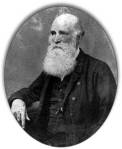
In the 19° century CE there was no television or so much entertainment to bring people away form taking time to think about the matters of life and to take time to read the Bible. At that time there were not so many afraid to be a Bible reader. Fleeing from the misery in Europe, looking for better pastures, many Europeans found lots of time to read the Bible on the boat voyage to the New World. The young medic from England, John Thomas (1805 – 1871) whose father took up various pastorships including a congregation in London, when going for a prospect across the ocean, had enough time to read in the Bible and to discuss it with others from different denominations. When at a ferocious storm the ship lost the top of the main-mast and heavy seas stove in the bulwarks, washing everything moveable off the deck Dr. Thomas also feared, like many others, his life. He made a vow to dedicate his life, should he be spared, to religious study and to seeking out the truth about the matter of life and death.
After a change in wind direction, the captain was able to turn the ship back out to sea and to get it safe in a port. Thomas never forgot his vow and spent the rest of his life devoted to Bible study, determined to understand the true message of the scriptures. His efforts and several discussions with other Bible researchers or Bible students, got him to see that several preachers had some very good ideas but also some ideas which were not correct according to what was written in the Bible. He collected all the good ideas, or the teachings which were in accordance to the Biblical teaching. Holding fast on the testimony of the Scriptures, he wanted to follow Jesus Christ in not to chose for his own will and not for following human beings but to follow the Will of God and to live according to God His directions which could be found in the Word of God, the Bible. For him it was clear that God had given His Word to educate mankind and to give them insight in the Works of God and to let them understand the Plan of God.
Starting from the Word itself was what he found, should bring people to God. They should not have to get specialised scholars, theologians or clergy to bring God’s Word to the people and to educate them in what God wanted from man. everywhere in the world those who are willing to search in God ‘s Word can find the truth, according John Thomas and many other Bible Students.
For John Thomas it became also very clear that the Kingdom of God is to be sought for on the earth, at present occupied by the kingdoms of men – an earth which Jesus said the meek should inherit, which they never have done yet.
“Blessed are the meek: for they shall inherit the earth.” (Matthew 5:5 ASV)
“For evil-doers shall be cut off; But those that wait for Jehovah, they shall inherit {1} the land. {1) Or [the earth] (and so in verses 11, 22, 29, 34)}” (Psalms 37:9 ASV)
“But the meek shall inherit the land, And shall delight themselves in the abundance of peace.” (Psalms 37:11 ASV)
For John Thomas it also became very clear that the Bible is more than just the New Testament, like so many churches only use some parts of those later books but forget to compare them with the Torah and the Book of Prophets or Nevi’im. They note that the apostles expounded the Kingdom of God from the prophets (Acts 28:23). They find Paul saying the gospel was promised in the prophets (Romans 1:2): and that in preaching the gospel,”he said none other things than those which the prophets and Moses did say should come” (Acts 26:22).
He also found that there is no immortal soul in the Bible, because the soul is just the being of something, be it man, animal or plant, the life in it which comes forth from God and which God takes away at His time. For him a gospel which is contrived for the salvation of immortal souls cannot be the Bible gospel.
Those who do not want to accept that a man could really follow the Will of God and that no man can be tempted and not sin, do not belief in the possibility any human person can become like Christ, nor value that what Christ did. God cannot be tempted, but Jesus was tempted more than once, still he did not go in temptation and kept doing only the Will of his heavenly Father, even in the hour of his death, when he asked God to do His (Jehovah’s Will) and not his (Jesus’ will)
“saying, Father, if thou be willing, remove this cup from me: nevertheless not my will, but thine, be done.” (Luke 22:42 ASV)
Jesus also learned his followers also to ask God to fulfil His will and not ours.
“Thy kingdom come. Thy will be done, as in heaven, so on earth.” (Matthew 6:10 ASV)
Therefore John Thomas saw the importance to look for the Kingdom of God in such a way that it would not go against God’s Wishes.
Getting others to preach
Like the disciples departed and went through the towns, preaching the gospel (Luke 9:6) John Thomas went around the country preaching and encouraging several others who also went around preaching the Good News. Those going around tried to reach all sorts of people and get them to understand they had to become followers of Christ and to have themselves baptised by going under water. Though all should know that they had to be brought forth, or born again, by the holy spirit to become Jehovah’s spiritual sons. (John 1:12, 13; 3:5-7) Thomas considered himself just as a tool, like all Christians should become a tool in the hands of God, inviting others to the Truth so that they can being adopted by Jehovah as “sons,” and becoming Jesus’ brothers. (Romans 8:15; Ephesians 1:5)
“For ye received not the spirit of bondage again unto fear; but ye received the spirit of adoption, whereby we cry, Abba, Father.” (Romans 8:15 ASV)
“having foreordained us unto adoption as sons through Jesus Christ unto himself, according to the good pleasure of his will,” (Ephesians 1:5 ASV)
No man, but Christ Jesus leader
Jesus called those who would make up the faithful slave class his brothers. Each of us should offer himself to become a slave for God. In the illustration about the separating of the sheep from the goats, Jesus clearly states that he takes personally the way we treat his brothers. In fact, he said that the determining factor that would distinguish a sheep from a goat would be the way an individual treated even “the least of these [his] brothers.” Therefore, the primary way that those with the earthly hope demonstrate their desire to be friends with Christ is by supporting the faithful slave class. Every person calling himself a Christian should share with others around him the hope to live on earth under God’s Kingdom, expressing their friendship toward Christ’s brothers by wholeheartedly sharing in the preaching work. Christ commanded his brothers to preach the good news worldwide. (Matthew 24:14)
Today it may look a little-bit disastrous. when looking around not many others than the Jehovah Witnesses can be found really taking up the task given by Jesus Christ to witness or to preach. The remaining ones of Christ’s brothers on earth today would be hard-pressed to shoulder that responsibility without the assistance of their other sheep companions. Really, each time members of the other sheep class engage in the preaching work, they help Christ’s brothers to fulfil their sacred commission.
We can not buy friendship with Jesus or Jehovah. Not the giving of some pennies or cents is going to buy you free. More important is what you are willing to do for God and how much time and energy you want to invest in that what Jesus asked his followers to do. Christians should as brothers and sisters love each other but also should want to have their brotherhood growing. Brothers in Christ have come to understand and experience love by helping each other to grow in the truth and to live sacrificial for our fellow believers, and not just be out for themselves. When they see some brother or sister in need and have the means to do something about it they may not turn a cold shoulder and do nothing, they do have to do more than just talking about love. They have to practice real love in “deed and truth” (1 John 3:16-18).
Jesus continues to care for us not only through the oversight of loving shepherds but also by providing us with spiritual mothers and brothers and sisters within the congregation. (Read Mark 10:29, 30) which is made up by simple men and women who want to share their love and knowledge, and is guided by the elder people, while Christ always should stay the Head of the congregation
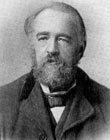
John Thomas invited all those who wanted to the Will of God to enter into covenant to live a new and promising life of loving effort for God’s glory. the problem in later years was that Robert Roberts (1839 – 1898) wanted to give John Thomas a higher place than he would ever wanted. Roberts had become convinced of the soundness of Thomas’ book Elpis Israel- An Exposition of the Kingdom of God wherein the “the hope of Israel” is explained. Thomas did not see, nor do the Christadelphians see, the book as inspired by God, but wanted to give more a deep and accurate study of The Bible.
In “the Ambassador of the Coming Age” the British journalist Robert Roberts took up the same cause as John Thomas did with his publication of “the Herald of the Kingdom”, which set out Bible teaching on the resurrection and the Kingdom of God. Roberts collected subscriptions and organised the distribution of John Thomas’ exposition of the Book of Revelation, Eureka (3 vols. 1861, 1866, 1868), in England, and (in time) many of his other works. Roberts raised the money to fund what would be the last trip of Thomas to England in May 1869. Toward the end of this trip, March 1870, Thomas made Roberts custodian of all his affairs in the event of his death, which occurred sooner than anticipated in 1871.
Robert Roberts considered John Thomas as “the Paul of the nineteenth century” in tribute to his ardent zeal and untiring labours in love of the Truth. Though Roberts was prominent in the period following the death of John Thomas in 1871, and helped craft the structures of the Christadelphian body his authoritarian attitude also made that there came to exist many different groups. For some brethren it was clear that Robert Roberts displayed a serious personality disorder. He was eager to disfellowship any person who had other ideas than him. The Christadelphian believers who slightly differed from his understanding of Bible teaching over trivial matters were rejected. His insecure, paranoid and inappropriate reaction to brethren who were his intellectual superiors, was a further manifestation of his inability to control failings in his own character. Today Roberts could be described as a control freak who easily felt threatened. Later at the turn of the 20° to 21° century another control freak (“the Man from the North”) also would take care that in several countries one group of Christadelphians could not meet with other Christadelphians because they are affiliated with the Christadelphian Bible Mission and do not want to give themselves to his own organisation.
Initially the denomination grew in the English-speaking world, particularly in the English Midlands and in parts of North America. In the early days after the death of John Thomas the group could have moved in a number of directions. Doctrinal issues arose, debates took place and statements of faith were created and amended as other issues arose. These attempts were felt necessary by many to both settle and define a doctrinal stance for the newly emerging denomination and to keep out error. As a result of these debates, several groups separated from the main body of Christadelphians, most notably the Suffolk Street fellowship and the Unamended fellowship.
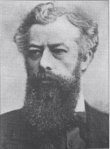
In 1873, the Nazarene Fellowship, led by Edward Turney of Nottingham, separated over the atonement. The division was relatively short-lived, however, with most of the 200 people who had left returning within the next few years. Following his death in 1879, Turney’s most active supporter, David Handley of Maldon, returned to the main grouping, and the group gradually nearly died out in the 19th century to become revived some decennial later.
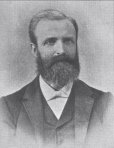
Robert Ashcroft, a leading member, wrote an article which challenged Christadelphian belief in plenary inspiration and which, although he himself left, led to a division in the main body. One group formed over the inspiration of the Bible a new ecclesia which later met in Suffolk Street, Birmingham and therefore were referred to as the the Suffolk Street Fellowship. The group they had separated from, became known as the “Temperance Hall fellowship”.
J.J. Bishop and J.J. Hadley (d. 1912), then Thomas Turner, and finally Cyril Cooper (till reunion in 1957) edited their main magazine “The Fraternal Visitor“(1884–1957). The Temperance Hall-Suffolk Street reunion was closely followed by union in 1958 with the Shield fellowship (allied to the Suffolk Street fellowship) through an understanding expressed in a document called the Cooper-Carter Addendum. The Central fellowship in North America is often referred to as the Amended fellowship.
In 1898, the Unamended Fellowship separated as a result of differing views on who would be raised to judgment at the return of Christ.
The majority of Christadelphians believe that the judgement will include anyone who had sufficient knowledge of the gospel message, and is not limited to baptised believers. The majority in Britain, Australia and North America amended their statement of faith accordingly. Those who opposed the amendment in North America became known as the “Unamended fellowship” and allowed the teaching that God either could not or would not raise those who had no covenant relationship with him.
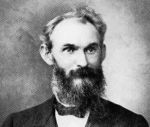
Opinions vary as to what the established position was on this subject prior to the controversy. In North America those who continued to associate with Britain on the basis of the amended 1898 statement became known as the Amended Fellowship, in contrast to the Unamended Fellowship, who took their lead from the Christadelphian Advocate Magazine of Thomas Williams of Chicago.
20th Century
Many more people came to see the importance of Israel in God’s Plan and how the Israelites or the believing Jews would stay the chosen people who would find the city Jerusalem restored as the city of God. The other people than those born from the Judaic tribes might for ever stay “the foreigners” but they too shall have to play an important role in this system of times.
More brethren came to see that they as foreigners have a large part to play in Jehovah’s purposes during these last days. They come to the”spiritual Israel” of God in order to worship Jehovah. (Zechariah 8:23) With that spiritual nation, they offer acceptable sacrifices to God and enter into the sabbath resting. (Hebrews 13:15, 16) Moreover, they worship at God’s spiritual temple, which, like the temple at Jerusalem, is “a house of prayer for all the nations.” (Mark 11:17) But each house, every place can be a place of prayer. Everywhere people can worship God. There should not be build special places for worship. They may be a good asset or make the meetings more practical to have at regular times. But they are not a must to build a congregation of believers or to have an ecclesia working. In private or public places the brothers and sisters in Christ can come together and exercise their faith in the ransom sacrifice of Jesus Christ. They should not serve people or their leaders, but should present them selves as slaves for God under Christ serving Jehovah constantly, “rendering him sacred service day and night.” (Revelation 7:14, 15).
In the 1950s Ernest Brady revived Turney’s cause and the Nazarene Fellowship.
Frank George Jannaway (London 1859-1935) was an English Christadelphian writer on Jewish settlement in Palestine, and notable for his role in the conscientious objector tribunals of World War I. He gave regular public lectures at the South London Ecclesia first at Westminster, from 1882 then at Islington and Clapham, and was a notable debater. His debates were not just on doctrinal subjects (e.g. 1894), but also, more unusually for Christadelphians, on the subject of Christian Socialism (1908, 1909). Jannaway strongly urged that to become stretcher bearers was still participating in the war. In 1914 Jannaway undertook the compilation of a register of all brethren likely to be affected by the draft, with the objective to keep the Christadelphian body entirely outside the Army. In doing so he succeeded in obtaining signatures from 154 Christadelphian “ecclesias” across Britain, with the notable exception of Temperance Hall, which had already drafted, its own petition of 1,000 members, leaving open the issue of non-combattants, but hesitated to submit it to Parliament. On 11 February 1915 Arnold Stephenson Rowntree, the Quaker Liberal M.P. for York presented Jannaway’s petition to Parliament, which was accepted and made Birmingham’s petition irrelevant.
Frank George Jannaway his reaction to controversy was to separate from others in the name of purity, and he was instrumental in the formation of minority factions or new branch or sub-groups, such as the Berean Christadelphians formed in 1923. However, this reasoning eventually caused him to separate even from his own brother, Arthur Thomas Jannaway (1854–1938).
The name ‘Berean’ is an allusion to the believers from the town of Berea (Acts 17:10-13), who were noted for their continual study of Scripture as the sole basis of their belief. Berean Christadelphians do regard themselves as set apart to serve God. Because of this, they try to live to the highest moral standards and avoid activities that they regard as ‘of the world.’ For example, they don’t worship with other Christian denominations or other religious groups because they don’t believe it appropriate to do so with people who don’t share a common doctrine.
In 1942 the Bereans again divided over marriage and divorce with the stricter party forming the Dawn Fellowship. The majority of the North American Bereans re-joined the main body of Christadelphians in 1952; though a number continue as a separate community as of 2013.
The Christadelphian position on conscientious objection came to the fore with the introduction of conscription during the First World War. Varying degrees of exemption from military service were granted to Christadelphians in the United Kingdom, Canada, Australia, New Zealand and the United States. In the Second World War, this frequently required the person seeking exemption to undertake civilian work under the direction of the authorities. During the Second World War the Christadelphians in Britain assisted in the Kindertransport, helping to relocate several hundred Jewish children away from Nazi persecution and founding a hostel Elpis Lodge. In Germany the small Christadelphian community founded by Albert Maier went underground from 1940-1945, and a leading brother, Albert Merz, was imprisoned as a conscientious objector and later executed.
In the 20th century, more moves were taken to try to reunite various of the earlier divisions. In the early 1950s the majority of the Berean Fellowship re-joined the Temperance Hall Fellowship, with the remainder continuing as a separate community.

In 1957-1958, there was further reunion with the Suffolk Street Fellowship, which had already incorporated many of the Unamended Fellowship outside North America. This re-united group, which now included the large majority of Christadelphians, became known as the Central fellowship named after the Birmingham Central ecclesia. In Australia and New Zealand a union occurred in 1958 between the Central fellowship and the Shield fellowship (which was allied to the Suffolk Street fellowship) through an understanding expressed in a document called the Cooper-Carter Addendum. Those who held that the reasons for separation from the Suffolk Street Fellowship remained, opposed the re-union and formed the Old Paths Fellowship.
There is also some co-operation between the Central (Amended) and Unamended Fellowships in North America – most recently in the Great Lakes region, where numerous Amended & Unamended ecclesias have opened fellowship to one another despite the failure of wider attempts at re-union under the North American Statement of Understanding (NASU) in recent years.
Despite success in reuniting large sections of the wider Christadelphian community and periodic efforts at reuniting smaller offshoots, there are still a number of small groups who remain separate from other bodies of Christadelphians. These include the Berean Fellowship, the Dawn Fellowship, the Old Paths Fellowship, the Companion Fellowship and the Pioneer Fellowship. However, Dawn Christadelphians and the former Lightstand Fellowship in Australia united in November 2007.
Most of the divisions still in existence within the Christadelphian community today stem from further divisions of the Berean fellowship.
Today: The post-war, and post-reunions, period saw an increase in co-operation and interaction between ecclesias, resulting in the establishment of a number of week-long Bible schools and the formation of national and international organisations such as the Christadelphian Bible Mission (for preaching and pastoral support overseas), the Christadelphian Support Network (for counselling), and the Christadelphian Meal-A-Day Fund (for charity and humanitarian work). The period following the reunions was accompanied by expansion in the developing world, which now accounts for around 40% of Christadelphians.
Christadelphianism
Christadelphianism does not owe its existence to a human leader and does not claim to have received a new revelation. Christadelphians profess no new principle: they own to no new teachership. They are simply and purely the result of Bible study, thoroughly conducted.
The Bible students considering themselves under Christ’s rulership owe their development to the application of a principle, in which it has been customary for all Englishmen to boast – the right of private judgement in the discernment of religious truth. Men rejoice in the work of Martin Luther because they rejoice in this, that the Bible is the word of God, and to embrace what it teaches, and reject what it denounces, however many may be arrayed against the conclusions to which the study of it may lead them.
“… all systems and doctrines are to be discarded that conflict with what is to be found in the Bible, however ancient or popularly supported such systems or doctrines may be.”*
Christadelphianism is nothing more nor less than the result of that principle strictly carried out.
Christadelphianism takes its stand on the Bible. It maintains that the Bible can be proved to be divine, and that it is the only source of divine ideas at present in the earth on the subject of religion; and that all systems and doctrines are to be discarded that conflict with what is to be found in the Bible, however ancient or popularly supported such systems or doctrines may be. In maintaining this, the Brothers in Christ only maintain what the bulk of the English people profess to believe. If they go a step further, and say that the popular systems of the day are in conflict with the Bible, they raise an issue which may disturb complacency, but which ought to receive a sympathetic attention at the hands of so ultra-Protestant a nation as the British. It is a plain, intelligible, and debatable issue, in which there is no fanaticism, or anything to offend the highest culture, or the purest reason.
“The Christadelphians put down nobody… the question is, are the Christadelphians right in what they say the Bible teaches? Because, if so, it follows that those who reject the teaching must be wrong”*
It is the result of the issue that excites the offence, and causes the Christadelphians to be everywhere spoken against.
The ordinary neighbour says he could do with the Christadelphians holding the Bible up; he may even go to the length of saying he admires the fidelity of the Christadelphians on this point; but what he cannot do with is their pulling down everybody else as wrong. Well, this is not exactly the right way of putting it. The Christadelphians put down nobody. It is natural for our good-humoured neighbours to feel in just this way about it; but the question is, are the Christadelphians right in what they say the Bible teaches? Because, if so, it follows that those who reject the teaching must be wrong; and that it is a pity to divert attention from the main issue by questions of style.
Fro the Christadelphians it is not important to be liked by human beings enjoying with them the traditions of man, but to live in accordance with the Word of God. In the case by doing this they may not be liked by others, so be it.
For Christadelphians their baptism is an act of obedience to God as a direct result of the new perspective, and it is therefore an important part of the process leading to salvation. Finally, it’s also a token of committing to that new understanding – the expression of our new faith, and the beginning of a new life in Christ.
+
* Note:
Parts of this text are also based on a tract called “The Sect Everywhere Spoken Against,” written by Robert Roberts in the late 1800′s. It is actually the transcription of a public lecture he delivered on “The True Character and Faith of the People Known as the Christadelphians.” The lecture was transcribed from notes and shorthand, compiled and published after his death.
++
Please do find:
Our older articles presenting the Christadelphian people, with a brief history, and talking concerning gospelfaith, presenting what Faith is or should be. Faith and works, plus faith mouving mountains, bringing people together united in brotherly love according first century patterns with the belief that full authority belongs to God. In those older articles is been looked at God’s design in the creation of the world, God’s instruction about joy and suffering plus God’s promises whereby God’s measure is not our measure.
The two newbies:
and further:
- Six Reasons Young Christians Leave Church
- No man is capable of self-improvement on his own
- Looking for True Spirituality 5 Fruitage of the Spirit
- Plain necessary food of the gospel
- Commit your self to the trustworthy creator
- A Living Faith #1 Substance of things hoped for
- The Way To Life
- Our way of life
- Discipleship way of life on the narrow way to everlasting life
- There’s no thief like a bad book
- WWJD
- A Society pleading poverty
- Follower of Jesus part of a cult or a Christian
- Bloggers for Christ and Bloggers for Peace
- Position of the Bible researcher
- Perishable non theologians daring to go out to preach
- Writers needed to preach to non-believers
- Immortality, eternality – onsterfelijkheid, eeuwigheid
- Is there an Immortal soul
+++
Related articles
- Why conservative Christians would have hated Jesus (salon.com)
In “God-fearing America” the poor are now the “takers,” no longer the “least of these,” and many conservative evangelicals side with today’s Pharisees, attacking the poor in the name of following the Bible.
+
Confronted by the Bible cult called evangelicalism we have a choice: follow Jesus or follow a book cult. If Jesus is God as evangelicals and Roman Catholics claim he is, then the choice is clear. We have to read the book–including the New Testament–as he did, and Jesus didn’t like the “Bible” of his day. - Why Jesus Wouldn’t Cut It as a Pastor in Today’s Evangelical Megachurches (alternet.org)
Evangelicals and conservative Roman Catholics thrive on drawing distinctions between their “truth” and other people’s failings. Jesus by contrast, set off an empathy time bomb that obliterates difference.Jesus’ empathy bomb explodes every time a former evangelical puts love ahead of what the “Bible says.” It goes off every time Pope Francis puts inclusion ahead of dogma. It goes off every time a gay couple are welcomed into a church. Jesus’ time bomb explodes whenever atheists follow Jesus better than most Christians. - Robert Reymond: Who Owns The Holy Land, Part 5 (Conclusion) (psalm115three.com)
no Christian should advocate anything evenly remotely resembling legal discrimination against Jews because of their ethnicity or religion. At the same time, in light of the fact that the only hope of salvation for the Jewish people resides in the provisions of the Christian Gospel, it would be wrong, indeed, unloving and un-Christian, for Christians to encourage or to support Israel in the establishment and maintenance of its ethnic or religious “Jewishness” that is the ground of its hope of approbation before God. This is simply to take seriously the uniqueness and finality of Jesus Christ as the only Savior and the only hope not only of ethnic Israel but also of every race and every nation. The Bible denounces every hope for approbation before God that is not grounded in the person and work of Christ. Such approbation pursued through ethnicity or through good works is futile (Galatians 2:16). Therefore, the Jew, if he is ever to know genuine forgiveness by God, must forsake the notion that his racial connection to the patriarchs and/or his allegiance to Torah make him acceptable to God (Romans 2:17-29; Galatians 5:3-4). - Barack Obama on Christianity and Islam in His Own Words (godfatherpolitics.com)
We now know that Barack Obama was never properly vetted by the media. There are too many uncovered secrets that the media refuse to explore.
- The Fallacy of Pope Francis (defendingcontending.com)
Once again, the world has the distinction of hearing “Thus says the man in the white robe” instead of “thus says the Lord.” If we question the veracity of God’s Word and the foundations which He has established, then it will be easy to cut out further parts of Scripture. Here are a few things to consider as to whether pope Francis is right or wrong. - What are Brothers in Christ (christadelphianworld.blogspot.com)
There have been countless independent communities around the world who have eagerly studied the Bible and accepted its simple teachings and felt like spiritual siblings of Jesus Christ.


[…] Two new encyclopaedic articles […]
LikeLike
[…] Two new encyclopaedic articles […]
LikeLike
[…] Two new encyclopaedic articles […]
LikeLike
[…] hen die de Christadelphians nog niet kennen hebben wij nu twee nieuwe artikelen klaar gestoomd die een beeld mogen geven van wie wij zijn, waarvoor wij staan, waarin wij geloven […]
LikeLike
[…] Two new encyclopaedic articles […]
LikeLike
[…] Two new encyclopaedic articles […]
LikeLike
[…] Two new encyclopaedic articles […]
LikeLike
[…] Two new encyclopaedic articles […]
LikeLike
[…] Two new encyclopaedic articles […]
LikeLike
[…] Two new encyclopaedic articles […]
LikeLike
[…] Two new encyclopaedic articles […]
LikeLike
[…] Two new encyclopaedic articles […]
LikeLike
[…] Two new encyclopaedic articles […]
LikeLike
[…] Two new encyclopaedic articles […]
LikeLike
[…] Two new encyclopaedic articles […]
LikeLike
[…] Two new encyclopaedic articles […]
LikeLike
[…] Two new encyclopaedic articles […]
LikeLike
[…] Two new encyclopaedic articles […]
LikeLike
[…] Two new encyclopaedic articles […]
LikeLike
[…] Two new encyclopaedic articles […]
LikeLike
[…] Two new encyclopaedic articles […]
LikeLike